
When it comes to purchasing an air conditioner (AC) unit, you’re presented with a dilemma: should you go with a window, portable, or even a mini split AC? Air conditioning is the perfect way to cool down your home, and the people in it—especially useful during the hot and humid summer months. But which type of AC unit should you get? Let’s go over the differences between the types, as well as the pros and cons for each so you can pick the model that suits you best.
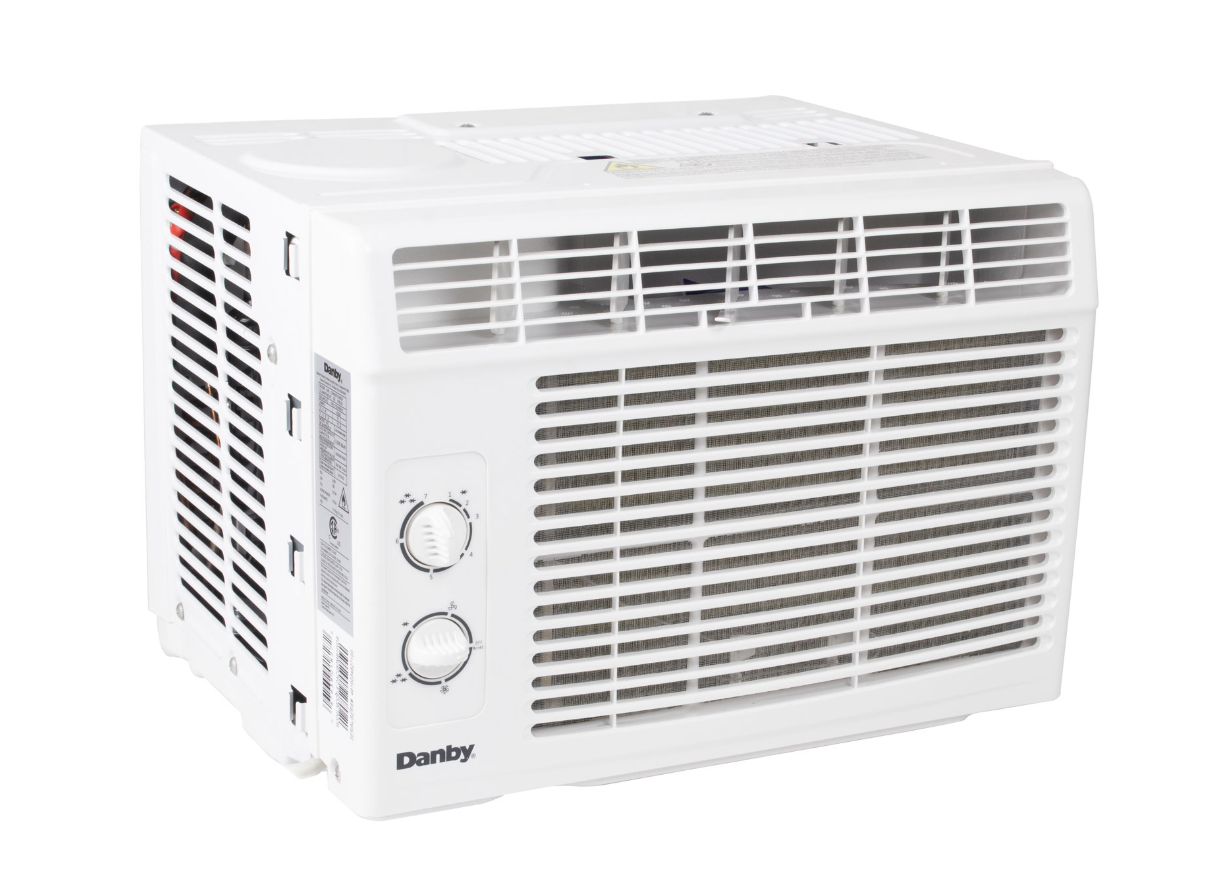 What is a window AC unit?
What is a window AC unit?
A window AC unit fastens to a standard-sized window (or even a cut-out in the wall) and provides cool air within a room. They exhaust hot air outside and bring cool air in.
Pros with a window air conditioner
- More affordable: These models are typically more affordable than portable AC units, so if you’re on a tight budget, it might be the better option to consider.
- Quieter: Window AC units can sometimes be less noisy than a portable AC, running in the background without much disruption.
- Can cool larger rooms: While it depends on the specific model, many window ACs can cool larger-sized rooms than a portable AC unit.
- Doesn’t take up floor space: Since a window AC unit mounts right onto a window, it doesn’t take up any valuable floor space in the room. If you have a small home, this could be an important consideration.
Cons with a window air conditioner
- Not as easy to put away: Portable air conditioners are larger and take up more space, but they are also easy to wheel away into a closet in the off-season. Window air conditioners require a bit more work to dismount them to store for the winter. With that said, once taken off, they can be put away in small spaces until you need them again.
- Might not be for renters: Some home rentals and apartments do not permit the installation of window AC units, especially ones that will go through the wall. If you rent a home, check with the homeowner or landlord to confirm before considering this option.
- Only fits standard-sized windows: A window AC will only fit standard-sized windows, so if you like in an old house (like I do) with smaller windows in certain rooms, it might not work.
Who should get a window AC?
If you own your home and are looking to cool a large room, a window air conditioner can be a good investment. It will cool a large room and won’t take up any valuable floor space. If you live where it tends to be hot for more than just a few months out of the year, you might appreciate a window AC as a more permanent installation solution. If you’re on a tight budget, and only looking to cool a single room, it might be worth trying out a window AC to see how it works for you.
What is a portable AC unit?
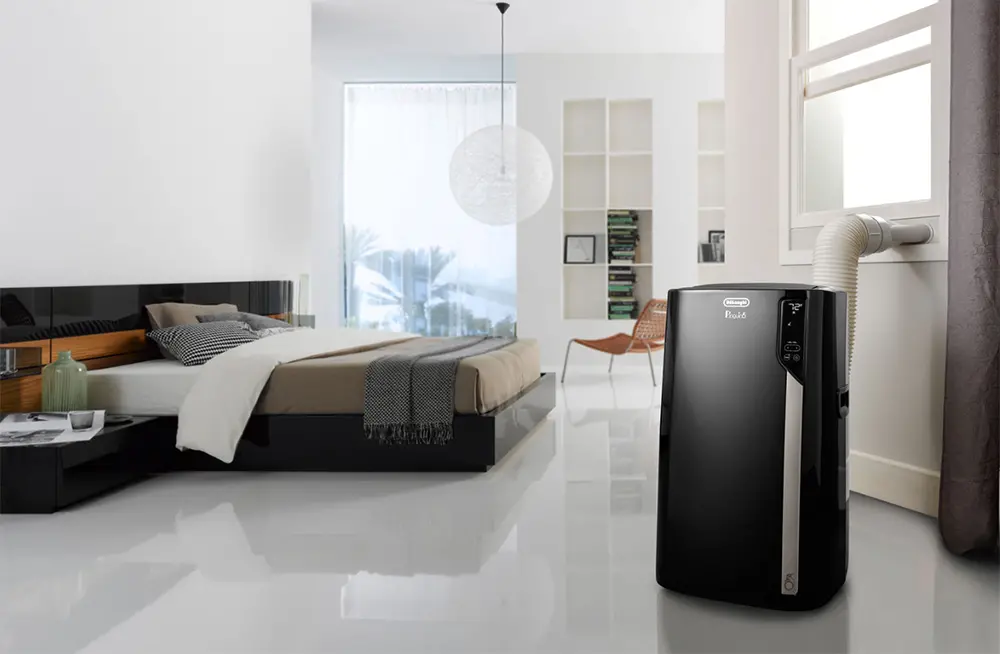
A portable air conditioning unit is, as the name implies, a portable, floorstanding unit that uses a hose to exhaust air from the room, then run that air out through a window or wall. There are also dual-hose models, with one hose that can bring in air from outside to cool the condenser, and a second hose to exhaust the heated air out. The house typically vents through a window. Some are self-evaporating and can recycle condensation back into the air, most require water drainage from time to time.
Pros with a portable AC
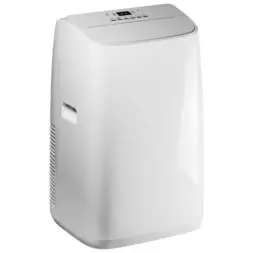
- Easy to move around: Most portable air conditioners come on wheels and with a carry handle making them easy to move from room to room. You might want to cool your home office during the day, for example, then move it to the bedroom at night. It’s easy to do this, though keep in mind that if it comes with a vent hose, you would have to mount it to the window in each room.
- Ideal for apartment dwellers, renters: If you rent a home or apartment and the landlord does not permit window AC installation, a portable AC is the perfect solution. You can still keep the home cool without having to break the rules. This is especially useful if the building shuts of the central AC at a specific time of the year but the hot and humid weather continues beyond that.
- Lots of features: The latest portable AC units have tons of cool features, from built-in timers to adjustable levels and even smart app control. Note that you can get these with window AC units as well. But with the ability to move a portable AC unit around, this can be especially useful.
- Easy to store away for the season: When you’re done with a portable AC, simply dismount the exhaust house and wheel it into a closet or the corner of a room. If you need it again during an unexpected heat wave, it’s easy to get back up and running without a complicated installation process.
Cons with a portable AC
- Possibly not as effective for larger rooms: Some experts say that a portable model isn’t as effective as a window AC unit in cooling large spaces. Estimates for the average room size hover around the 300-400 square-foot range. So you might want to opt for these only if you’re looking to cool relatively small spaces.
- Can be noisier: Portable AC units can be noisier. This will vary from unit to unit, and depends on the space you’re using it in as well.
- Can be more expensive: Since they are larger, easy to move from room-to-room, and don’t require installation in a window (other than for the vent hose, portable AC units can be more expensive.
Who should get a portable AC unit?
If you’re looking to cool different rooms at different times of the day, like a home office or living room during working hours and bedroom or nursery at night, a portable AC night is the best option. They are easy to move around, often on castors or with a built-in or recessed handle. Installation is simple, typically just involving plugging the unit in and mounting the exhaust hose to your open window. If you live in a rented apartment or house, a portable AC might be the only option if the landlord does not permit window AC installation. Finally, portable AC units are ideal for smaller rooms. They take up some floor space, but if you have a suitable corner to place it in, it will work well.
What is a mini split AC?
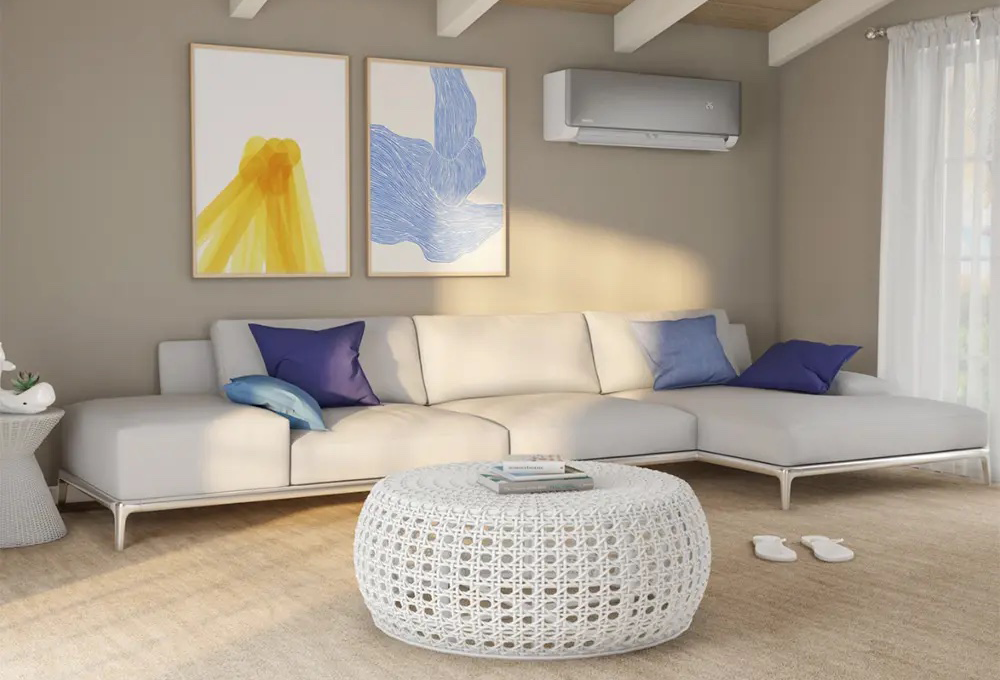
A mini split AC is a unique AC unit that includes both cooling and heating, allowing you to seamlessly switch between the two based on your needs. Like the others, it controls the temperature in a specific space or room of the home. Mini split air conditioners are especially good for larger spaces. They consist of an indoor, usually long and rectangular unit to handle air (i.e. an evaporator) and an outdoor compressor or condenser that looks similar to a traditional window AC, though it’s much larger and typically sits flat on the ground (or you can get a mounting bracket to mount it to the side of the house). The two need to connect to one another via conduit through the wall. This requires the help of a professional.
Pros with a mini split AC
- They are efficient: They are larger but this also means they run efficiently. You can keep a large space cool or heated quickly and evenly from the single unit.
- They are quiet: Despite the size, mini split AC units tend to run quiet, so you won’t find them distracting if you’re using it in a home office where you’re trying to work, the bedroom while you sleep, or the living room while you watch TV.
- They are good for larger spaces: Because of the size and power, mini split ACs are suitable for larger spaces, even as large as 1,250-foot open concept homes.
- They can cool (or heat) multiple rooms: Because of the size and power of mini split AC units, they can often cool or heat multiple rooms, such as an entire upper floor of the home or main level. You can decide on the perfect spot for installation (seek guidance from a professional) to maximize the heating and cooling.
Cons with a mini split AC
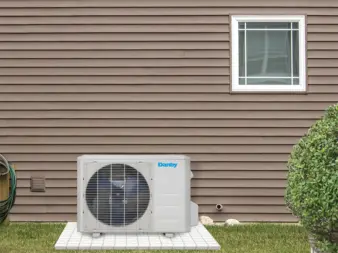
- They tend to be more expensive: Because they offer both cooling and heat, mini split AC units are generally more expensive. But balance this with the fact that you’ll be able to use them all year ’round. They will never be sitting inactive for an entire season.
- They require professional installation: While they are relatively easy to install, the average person will likely need to get the help of a professional to ensure it’s done right.
- Takes up wall space: These take up significant wall space not only on the inside of the home but also the outside. If you are looking to cool or heat a small room, or one with lower ceilings, you might find it overbearing.
- Not easy to move around: Once you install a mini split AC, it’s there until you decide to uninstall it. This would require moving both parts, running the conduit back through the wall, and potentially even closing back up the hole with drywall and paint. Bottom line: they are designed for more permanent installation, so you can’t easily move these from one room to another.
Who should get a mini split AC unit?
If you own your home, you can safely install a mini split AC with the help of a professional. These are more of a permanent solution and ideal for those who live where weather can fluctuate often. If you find you’re often needing to cool down a particular room one day then heat it up the following week because of an unexpected cold front, you’ll appreciate the versatility with a mini split AC. They are ideal for houses that don’t have ducted heating systems as well, like if you live in a rural area with a hot water heater, radiant panels, or space heaters. For larger spaces and homes, you may find mini split AC to offer the best coverage as well.
What to look for in an air conditioner
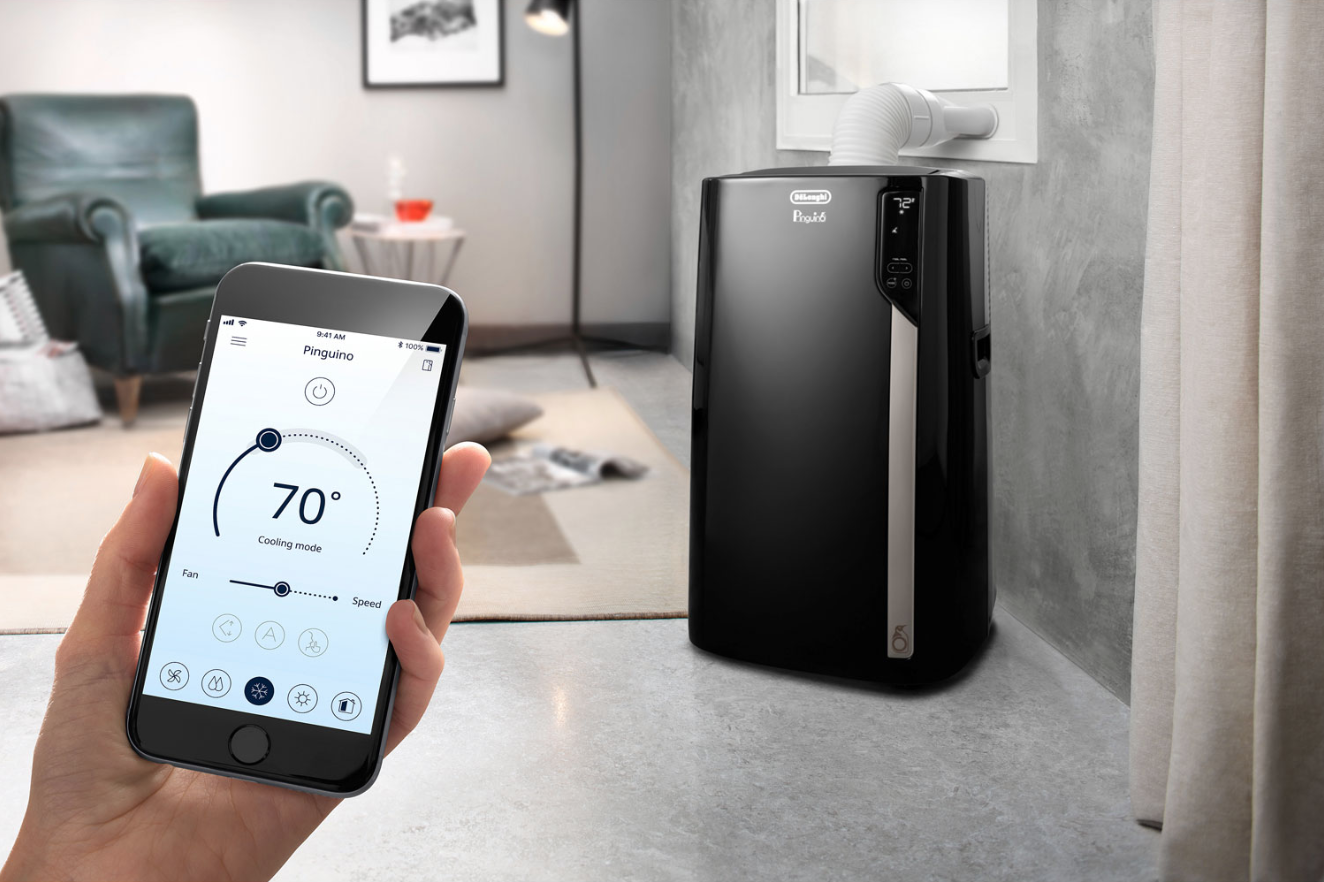
Regardless of whether you decide to go window or portable, there are a few key things to look for with the model you choose.
Easy installation
Look for a model that offers a relatively easy installation process, and has easy to clean filters and a simple process for water drainage (even better if the design eliminates the need to empty a bucket altogether).
Adjustable settings
You can save on energy by looking for a model with multiple settings so you can adjust how cool the room gets, and especially if you opt for one with a dedicated energy savings mode. Even better if you can set times when it goes on and off. For example, you might want to have it kick in every day a half hour before you arrive home from work, then shut off first thing in the morning. Some also have sleep modes so they’ll automatically turn off after a set period of time so you don’t accidentally leave it running while you’re gone for the day.
SACC BTU rating
For portable air conditioners, look for the SACC BTU rating or, if it isn’t on the product just yet (labeling might take time), choose a model with a higher rating than you’ll need to ensure sufficient cooling. We discuss what these measurements mean in the air conditioners buying guide. For window it conditioners, look at how big a space it is rated to cool to ensure it will be sufficient for your space.
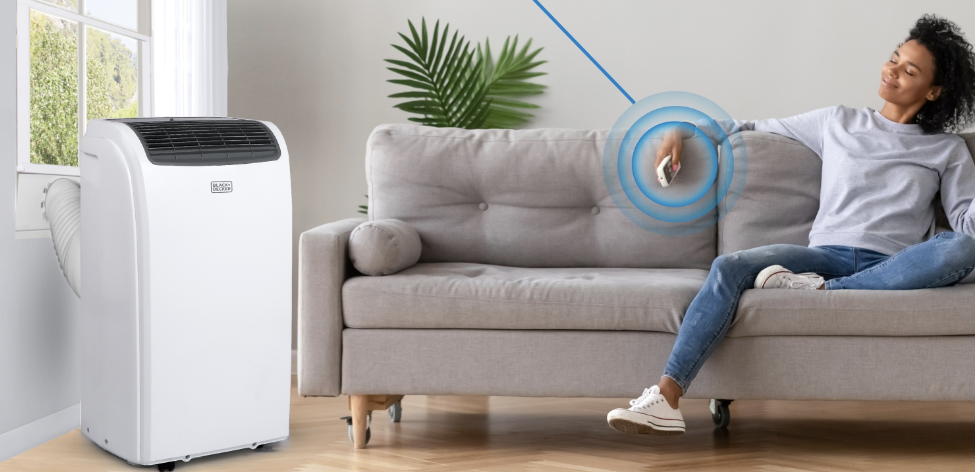
Remote control
A handy remote will make it easy to control the unit from the comfort of the couch or bed. Some might even include Wi-Fi so you can control them alongside other smart home devices, or even by voice.
Directional cooling
Make sure you can adjust the direction of the cooling so it isn’t blasting right at you, for example, or ideally, oscillating to keep the entire space evenly cooled. Some models even have a follow feature that will keep the cool air directed at you at all times, no matter where you are in the room.
Secondary functions
Some air conditioners, especially portable models, have dual functions, like the ability to emit hot air as well during the winter months. Some also come with built-in air purification so you can not only keep the room cool but clean the air as well. Others work as fans and dehumidifiers, so look at what else models you’re considering can do, and if those secondary features would be useful.
Keep cool this summer with an air conditioner
Depending on where you live in Canada, you might only need an air conditioner for a few months out of the year. But when you need it, you really need it. Once you’ve selected the right type of air conditioner and the perfect model to meet your needs, you can sit back and enjoy the cool breeze and comfort. And if you decide to go with a mini split AC, you can use it all year ’round.
Best Buy offers a wide selection of window, portable, and mini split air conditioners. Need more help deciding? Learn everything you need to know about air conditioners to help you make the right decision in the air conditioners buying guide.






Portable would be handier. But our current home has old windows that open outward and unable to find plexiglass to fit window with matching hole in it for the ac…sigh.
Comments are closed.